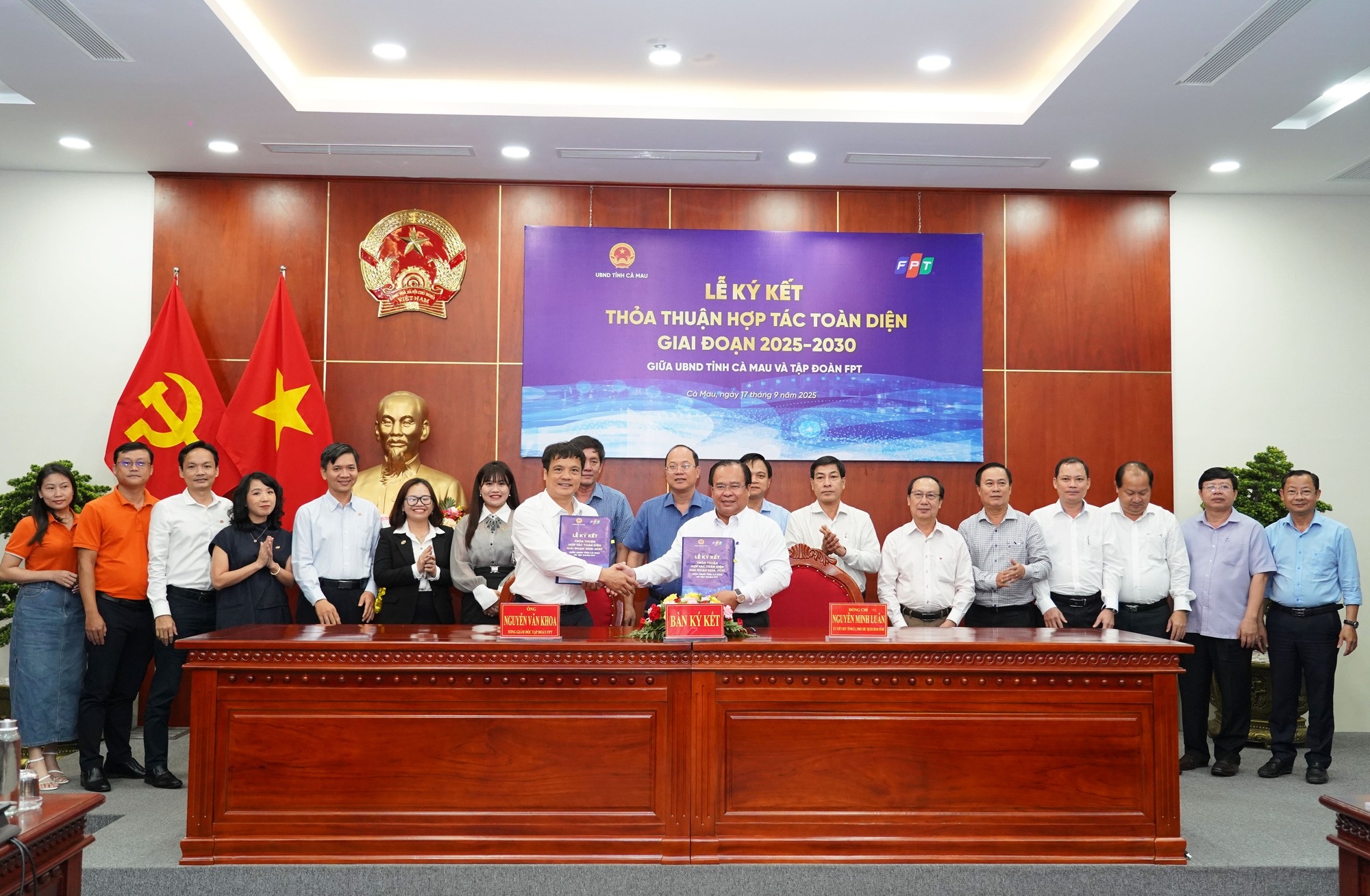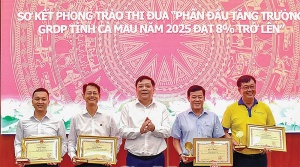INTERNATIONAL INVESTMENT
AND PORTAL
At the fifth meeting of Ca Mau Steering Committee for Science, Technology, Innovation, and Digital Transformation on September 18, it was highlighted that the province has best availed of opportunities in the current context to make strong strides.
 Nguyen Minh Luan, Vice Chairman of the Provincial People's Committee and Nguyen Van Khoa, General Director of FPT Corporation, represented the signing of a comprehensive cooperation agreement for the 2025-2030 period, Photo: baochinhphu.vn
Nguyen Minh Luan, Vice Chairman of the Provincial People's Committee and Nguyen Van Khoa, General Director of FPT Corporation, represented the signing of a comprehensive cooperation agreement for the 2025-2030 period, Photo: baochinhphu.vn
Vietnam’s recent efforts in boosting sci-tech development, innovation, and digital transformation have created a robust base for rapid development.
Within just three months post-merger, Ca Mau completed a substantial number of tasks. Of the 65 key tasks scheduled for 2025, 38 have already been completed, while the remainder are progressing on schedule.
Between July and September alone, 16 tasks were assigned to the province, of which almost two-thirds have been completed without any delays.
According to data from provincial agencies on monitoring and evaluating the implementation of Vietnam’s sci-tech and innovation vision as of September 6, just over half of all related tasks had been completed.
The Central Steering Committee for Science, Technology, Innovation, and Digital Transformation assessed that Ca Mau has met the essential conditions for operating a streamlined two-tier local government model. Furthermore, an official dispatch dated September 4 from the Office of the Party Central Committee confirmed that Ca Mau is not on the list of localities with overdue or uncompleted tasks in this area.
In addition to meeting urgent assigned duties, Ca Mau has swiftly deployed science and technology applications in real-world scenarios. In August, the province hosted a business digital transformation conference, drawing participation from more than 80 enterprises and encouraging innovation in production and business operations.
Ca Mau People’s Committee has also approved the scale up of a super-intensive, circular farming model for white-leg shrimp across 1,500 hectares.
At the same time, the province is forging strategic digital transformation partnerships with corporations such as Viettel, VNPT, and FPT.
The two-tier local government model is now fully operational in Ca Mau, functioning smoothly and effectively. The province’s administrative procedure resolution system is running stably and in full synchronisation with the National Public Service Portal.
Notably, online submission of administrative documents has reached 76 per cent, online payments touching 86 per cent, and citizen satisfaction rates exceeding 95 per cent, placing Ca Mau among the top-performing localities nationwide in digital public service delivery.
In a groundbreaking move, in August Hoa Thanh ward held a ‘paperless’ Party Congress for the first time, using AI for attendance tracking and note-taking. This innovation opens the door to a new approach in Party organisation, with plans to scale this model across other areas across the province.
Meanwhile, a highlight of Ca Mau’s efforts to bolster its core aquaculture economy is a newly-launched genome sequencing project for the iconic Ca Mau crabs.
The initiative is a collaboration between Ca Mau Department of Science and Technology, the University of Queensland in Australia, and the Vingroup Innovation Foundation, with a projected investment amounting to $10 million. The project aims to elevate the global profile of Ca Mau crabs through sustainable, high-tech scientific research. Additionally, the Department of Science and Technology has invited nearly 20 experts from Vietnam and abroad to join the provincial Advisory Council, which is tasked with consulting and proposing groundbreaking mechanisms, policies, and solutions in sci-tech and innovation.
With a determined push for comprehensive transformation, the Ca Mau Steering Committee for Science, Technology, Innovation, and Digital Transformation has reaffirmed its commitment to making these sectors the key engine to drive local sustainable socioeconomic growth, striving to achieve an economic growth rate exceeding 8.5 per cent in 2025 and beyond.
Nguyen Ho Hai, Secretary of Ca Mau Party Comittee and head of the steering committee, has instructed relevant agencies to conduct a comprehensive review of tasks requiring decentralisation to commune and ward levels – especially those related to digital transformation, high-tech agricultural development, digital industry, and smart urban management.
He also emphasised the need to evaluate performance outcomes, promptly commend exemplary collectives and individuals, and address delays or underperformance. These efforts aim to ensure the timely and effective implementation of the province’s digital transformation and sci-tech development goals, as crafted in the province’s socioeconomic development roadmap.
 New Ca Mau boosts industry and trade for stronger growth
New Ca Mau boosts industry and trade for stronger growth
Ca Mau’s industry and trade sector is driving bold reforms and key projects to fuel the Mekong Delta province’s ambitious 8.5 per cent growth target for 2025 and beyond.
 Ca Mau rides post-merger wave to build on tourism fortunes
Ca Mau rides post-merger wave to build on tourism fortunes
The recent administrative merger has created fresh momentum for Ca Mau, as the province accelerates efforts to unlock its tourism potential and position itself as a key destination in Vietnam’s southernmost region.
 Ca Mau infrastructure drive to boost merger potenial
Ca Mau infrastructure drive to boost merger potenial
Ca Mau province is pushing ahead with major infrastructure and public ventures, aiming to stimulate economic growth and strengthen development momentum.



















